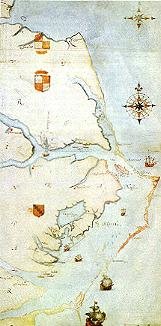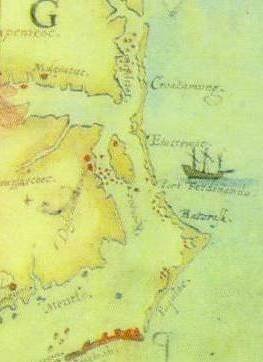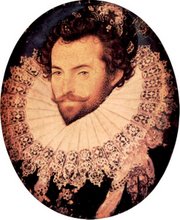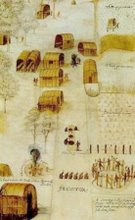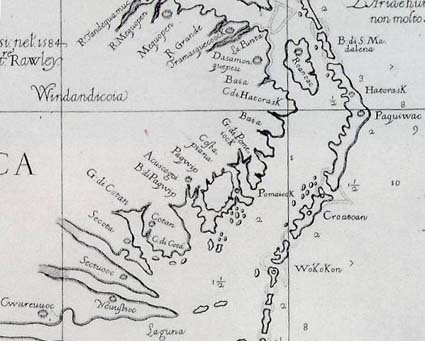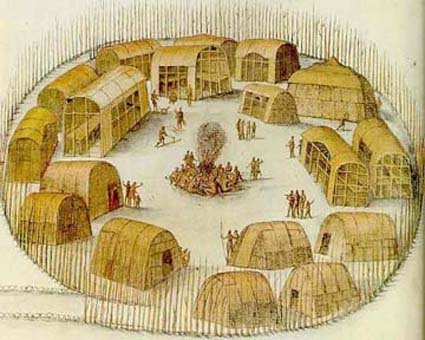The Lost Colony, an accident of fate with a tragic outcome that reverberates to this day, should never have happened. The group of colonists sent out by Sir Walter Raleigh in 1587 to establish the Cittee of Raleigh, had never intended to locate on the Island of Roanoke. But after a four month long trip marked by delays, mishaps, evasive tactics and possibly outright sabotage, these some 117 men, women and children were unceremoniously dumped on the island by Captain Fernandez. All but but two of them would vanish without a trace.
They had intended only to stop by the island where fifteen men had been left behind by Sir Richard Grenville the year before, after the failure of first settlement attempt. Governor John White and forty of his "best men" would make a short visit to check on the men, then they would continue on to their destination about 50 miles up the coast of the Chesapeake Bay. Exploration parties sent there previously had made favorable reports on the suitability of the area for settlement. But as soon as the pinnace carrying the men was in the water, Captain Fernandez ordered them to stay there on the island, forbidding them to re-board his ship, claiming he needed to return to the Caribbean as the season was growing short for privateering. Inexplicitly, he then sat at anchor for several weeks in a cruel taunting gesture to the colonists stranded on an island where something very sinister and unexplainable had obviously occurred. Among the first sights to greet the landing party were the bleaching bones of one of the fifteen Englishmen left behind the previous year. The other 14 had vanished without a trace, the fort had been destroyed and the houses had fallen into disrepair. Deer were grazing on melons which had grown up in the floors of the abandoned houses. Something was terribly wrong.
Trying to make the best of their situation, the Colonists began repairing the houses and building new more substantial ones of tile and brick. Their situation was truly precarious. Arriving too late to plant crops, they had not been allowed to take on salt, cattle, plants or fresh water at Hispaniola to replenish their dwindling supplies. They did not have sufficient food to exist for more than a few weeks. They were horrified when one of the assistants, George Howe, out crabbing alone, was killed and mutilated by Indians. Someone would have to return to England and get word to Sir Walter Raleigh that they were in peril. But who would even be able to see Raleigh and who would be believed? These men were, for the most part, middle class craftsmen and the like, unschooled in statecraft. There was only one answer after Christopher Cooper agreed to go, then withdrew his offer. The only man sure to get through to Raleigh and be believed was John White, the Colony Governor. He had been picked by Raleigh to lead this colony and was respected by him. John White did not want to leave his daughter, her husband and his granddaughter, nine day old Virginia Dare. The Colonists begged him to do so though and knowing it was their last chance, John White agreed to set sail with Edward Spicer, who had miraculously found the settlers after his flyboat became separated from them early in the voyage. White refused to sail with Captain Fernandez. He hurriedly prepared and left instructions for certain symbols to be carved if the colonists leave this location. They are to carve the name of the location to which they are relocating on door posts or trees; if they are in distress they are to carve a cross over the name.
Unfortunately, John White and Edward Spicer are blown far off course by terrible storms and barely make it to Ireland. By the time they reach England, Fernandez has been back for weeks, establishing himself as a hero of the expedition. White does see Raleigh, but it is unknown what he tells him.
John White will spend the next three years desperately trying to return to his Colony. He makes two abortive attempts to reach the Colonists from which he is lucky to survive the second one. He is injured and shot by enemy mariners attacking his ship. During this time, Sir Walter Raleigh's attentions are diverted in an attempt to save his Queen and save his country from the menacing threat of defeat by the mightiest Navy in the world; the Spanish Armada. Many believe he will fail. Queen Elizabeth I forbids the sailing of any ships to the area where the colonists are stranded. Due to Raleigh's efforts and history's most providential storm, the Spanish Armada is totally destroyed. England is saved.
To be continued:




